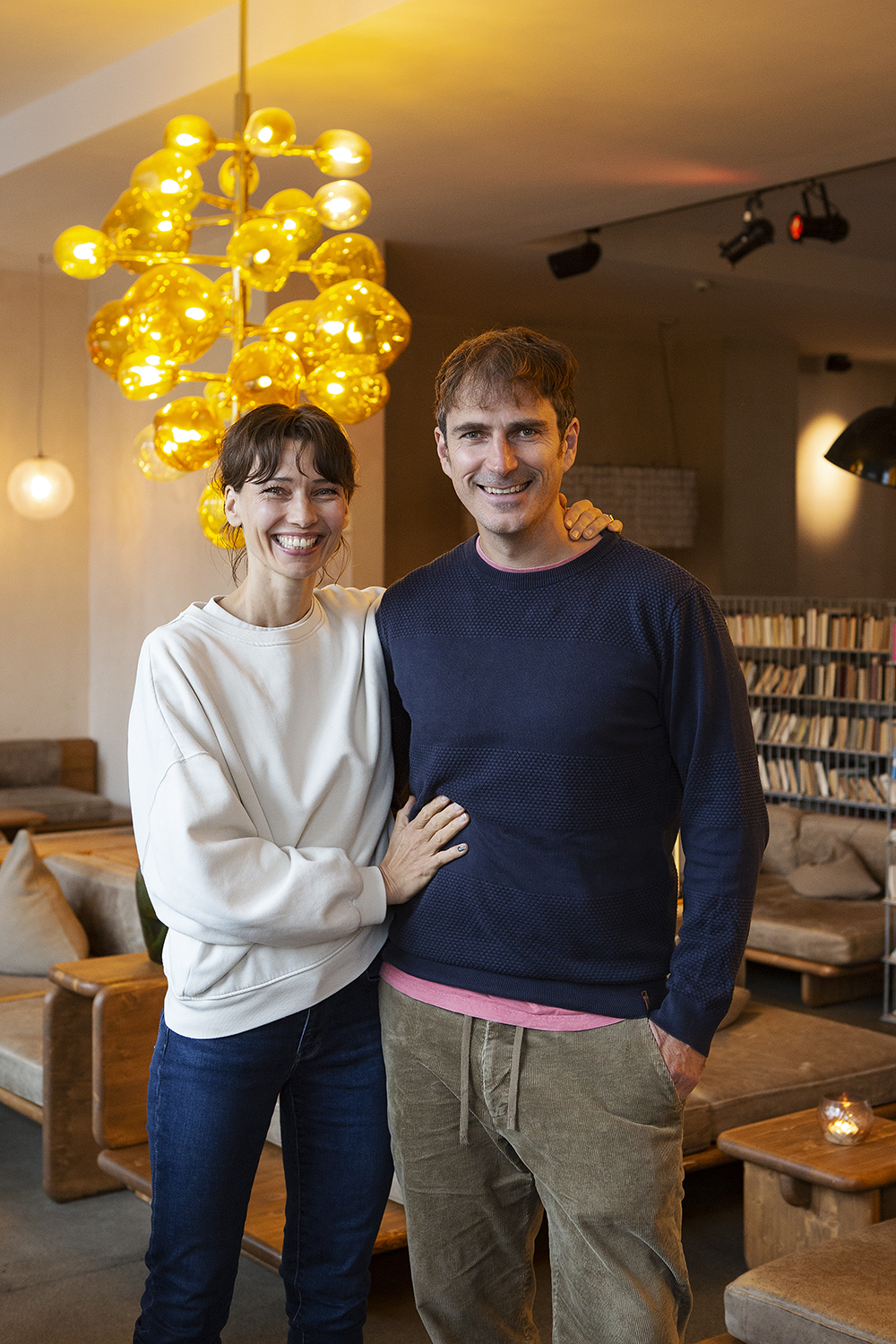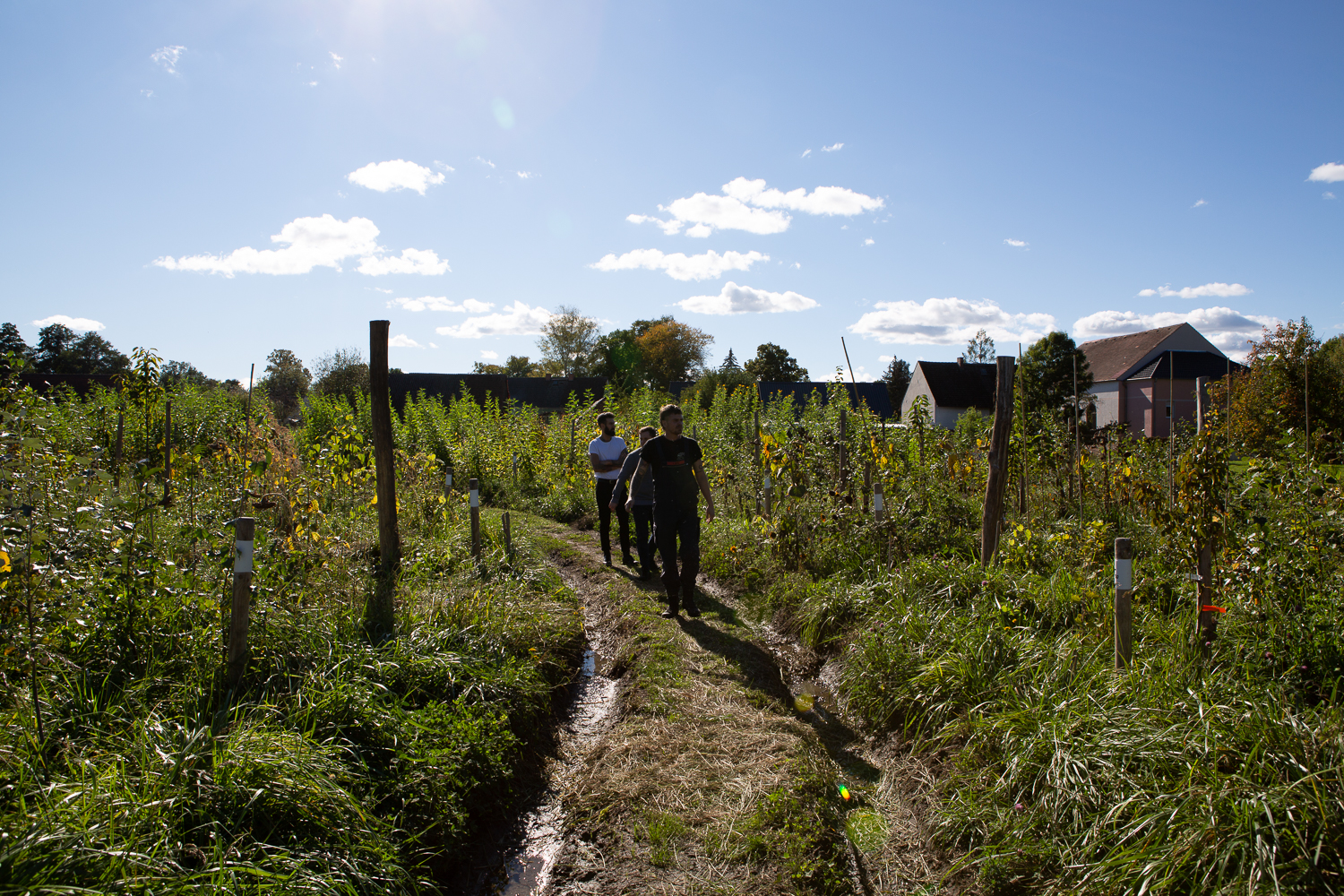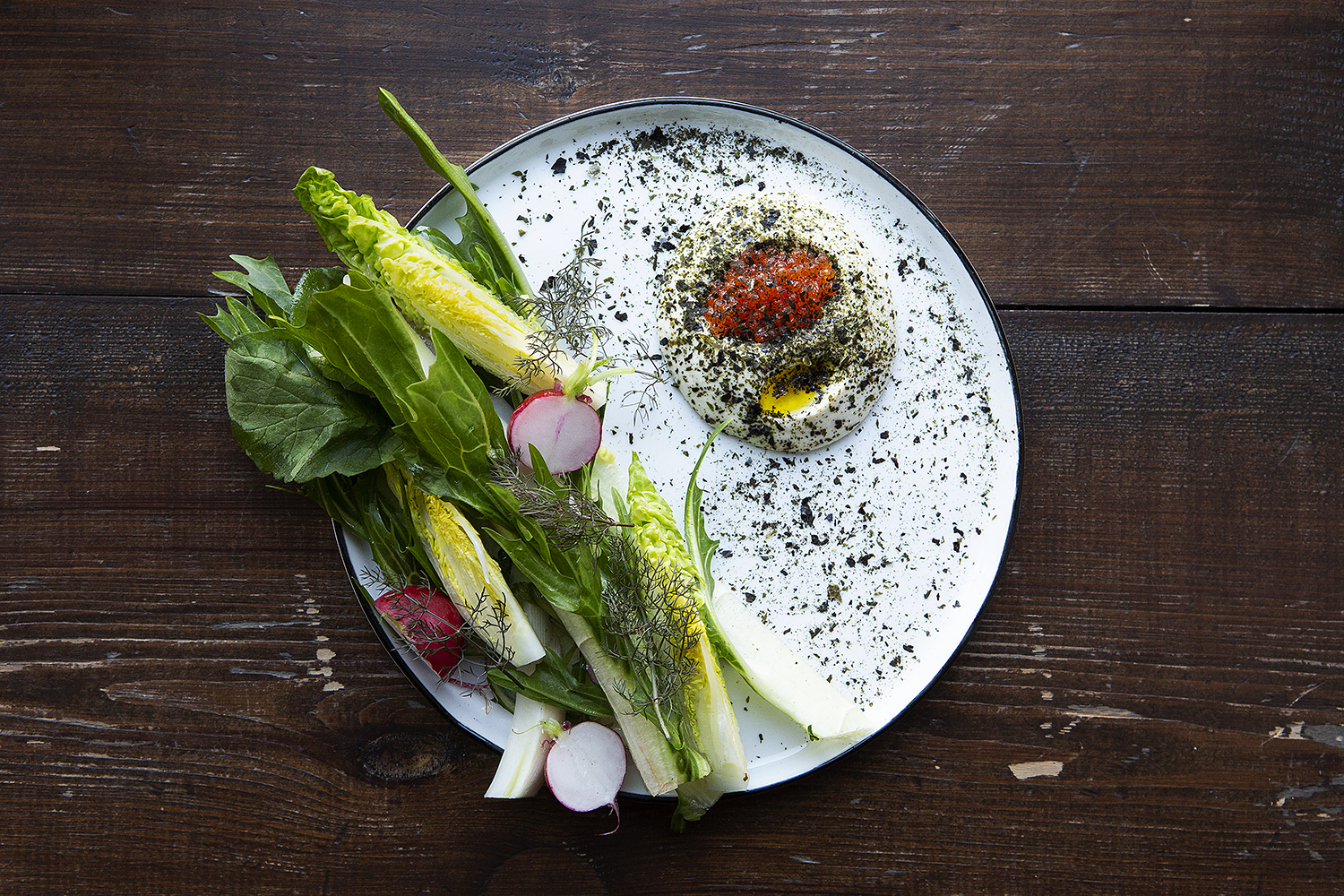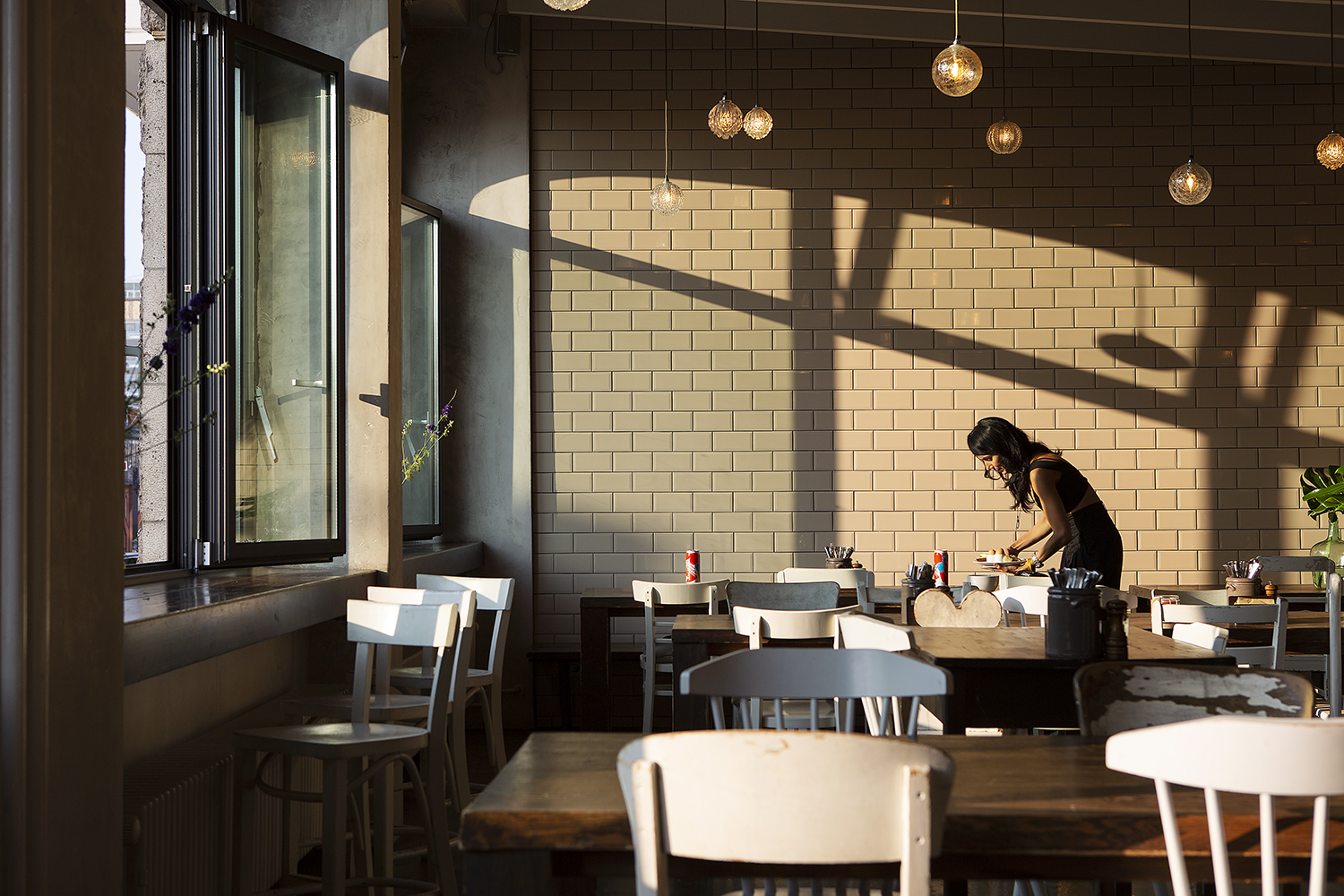Michelberger Hotel & Restaurant

In conversation with Nadine and Tom Michelberger who have been running the Michelberger Hotel in Berlin-Friedrichshain since 2009. We talk about their hotel and restaurant concept which also includes their own farm since 2018, and the importance of building a community and a strong network.
The Michelberger is very different from other hotels in Berlin, it is much livelier, offers space for different events and ideas. What was your motivation to create this place?
Tom: We are both very entrepreneurial and were looking for professional independence. We met in Berlin at the beginning of 2003 and were both inspired by what the city had to offer. The fixed idea of transforming a house of this size into a hotel or a platform for others relatively quickly turned into a tangible idea that got better the more we thought about it. At that time, hotels as social spaces were totally stunted; there were a few hostels that took up the theme in a very rudimentary way, but otherwise there were only chains and a few design hotels. We wanted to create a sense of family and belonging, a place that is shaped by the people who run it and that can contain very different components, that offers a platform to the most diverse people and brings us into contact with them.
Nadine: The contact with other people is exactly what allows a multiplication of certain ideas to take place. When we founded the hotel, there was nothing comparable and we simply tried out many things, for example building the reception back to back to the bar. For us, this was not only more efficient, but also gave all visitors the feeling of being welcome here. Everyone should feel invited, that was important to us.
Tom: We could probably have done a farm or other projects back then, but always with the same attitude. With the hotel, we have found a starting point that we can shape and that offers us a human, social and political form of expression where new ideas can be added all the time.
Keyword farm – you have been running your own farm for some time now. When and how did you come up with this idea?
N: We have always organised many events here on the topics of food and wine, among others, and have used our house as a platform as often as we could. At the end of 2018, it was a logical step for us to add our own farm in order to become even more independent and to secure access to good products. Logical in that our families have always had an agricultural connection, and we wanted to continue this relationship. This closed a circle for us, which we were able to complete through the type of farming we do there.
What form of agriculture is that exactly?
N: We practice regenerative agroforestry, which means that we step back as humans and let nature work itself. We are part of the system, which is made up of a variety of organisms – a kind of layered system that includes a herb layer, fungi, herbs, shrubs, vegetables, fruit trees and biomass trees, among others. We constantly stimulate growth and ensure that the plants network and communicate with each other, so that they can increase their yield, but at the same time also form an ever stronger humus layer, which contains all the minerals and nutrients that humans ultimately need for their immune system. For us, this is a very coherent system.
T: And for us something very solid and tangible – having theoretical ideas and thoughts is one thing, but then putting them into practice is the greatest joy for us, with which also comes the strongest learning curve. It is not about the size of the projects, but about the impact they achieve. Overall, this is an important realization for us and the hotel – if we had pursued faster growth, we would have lost exactly what makes us special. So far, we have always had a very good sense of the size up to which we can integrate things, up to which point growth is good for us.
N: But it has to be said that this form of agriculture is quite scalable, in both directions. It is a system that everyone can implement for themselves, whether on the balcony, in the garden or on thousands of hectares. It follows a system that is simply good for people, the soil and the climate.
T: The special thing is also that it is immediately visible. We’ve been doing this for two years now and yet you can already see so much, even though it’s all still very small.
“When we network, we have more power to change the very things that are needed. Because the need is definitely there. Only in a union of many is it possible to reform old structures. ”
Do you want to make the farm an experience for your guests one day?
T: By being able to fully experience it already, we definitely want to involve our guests more, both in our communication to the outside world and that they can go out to stay and participate.
N: We have already been able to bring a lot of our own products into our restaurants this year, even if annual vegetables require a lot of care and do not yet produce the full yield. The taste can’t be surpassed, you really feel like you’re eating energy with every bite. It’s absolutely unbeatable.
What impact did this have on the kitchen and your food offer?
N: Everything we had in terms of produce, we just put in the kitchen – from a certain point on, we didn’t even write menus, we just showed the guests a basket of ingredients that came fresh from the field that day. For this, they could choose whether they wanted meat or not, or if there were certain dislikes or intolerant. This was a way for us to fully focus on the processing and also showed us how valuable the products actually are. It also allowed us to have a much stronger exchange with the guests about the great importance of working and cooking in this way.
Have you always focused on regional organic products in your restaurants?
T: Our hotel has developed steadily over the years, and the restaurant has reinvented itself over the last three or four years. Eight or nine years ago, we switched the restaurant’s kitchen completely to organic products, some of which we buy directly from the producers.
N: Definitely, that was the first step, when we realized that the infrastructure was not at all prepared to offer organic products in higher volumes. Thank God Terra had agreed to take us on board at that time, so that we had covered the main demand for the time being and were able to ask many other small farms, fisheries, cheese dairies, etc. But the basic structure was not there at all, we had to find the answers to our questions and needs ourselves.
And how did you get in touch with the individual producers, how did you build up your network?
T: I often went to Markthalle Neun to find suppliers and get to know them, which is how a lot of things came about. The small, close-knit network that existed in Berlin back then has definitely grown considerably in recent years. I have the feeling that there is generally more interest in good products today. Our own focus was always on good products from the beginning – everything we found out for ourselves, we integrated into the hotel. We also never wanted to become a chain but were able to concentrate fully on this.
N: It is important for us to have close contacts, so the exchange with the suppliers has always been very personal. This also goes hand in hand with a higher appreciation for the products themselves than if you organize everything through the middleman.
Tom, you just mentioned that the restaurant has reinvented itself several times in recent years. In what way exactly?
T: One of the most striking changes we made was in the breakfast buffet, which looked very different at the beginning. When we started offering a lot more vegetable variations instead of classic things like scrambled eggs, bacon, orange juice, bread, people were a bit irritated and asked us about it, demanded things. But over time, and it really happened relatively quickly, the guests accepted the new offer and we were regularly asked about the fact that breakfast traditions at home are also changing – just because of what we offer them here.
N: Many guests have noticed that through good products, such as homemade bread, a completely different satiation effect occurs – namely through a third of the amount they otherwise ate. These experiences are important in order to really be able to change something. Through tasting, people become more sensitive.
T: Since we have been baking ourselves, people not only eat less and better products, but we also feel a considerable economic advantage. We no longer have the masses of products and waste that we had at the beginning. The changeover has simply made sense on all levels, so you ask yourself why everyone doesn’t do it this way.
Do you have further ideas and plans that you want to implement?
T: What is important to us in any case is to build the bridge between Berlin and Brandenburg even further, together with the community. The hotel industry and gastronomy have great potential, which is still untapped – and just waiting for consumer behavior to change is simply too passive. Those who have opportunities also have the responsibility to do something. The opportunities just have to be seized. We do not envisage that at some point only vertical farming or underwater plantations will be practiced. We see a huge opportunity in rediscovering and redefining agriculture in its original sense. By networking with others, we can bring such issues even more into focus.
“Just waiting for consumer behavior to change is just too passive. Those who have opportunities also have a responsibility to do something. ”
Are there any concrete projects?
T: What we would like to help set up is a kind of distribution centre for Berlin’s gastronomy – to bundle it and create an interface with Brandenburg’s agriculture.
The aim of the project is to create a new logistics system, for which existing logistics structures could be used and transformed. Instead, restaurateurs could join forces in shopping communities.
N: And communication on this topic must definitely be strengthened in order to create a functioning cycle. At the moment, certain Brandenburg farmers supply certain Berlin companies, but there is not yet a really dynamic cycle between production in the countryside and the metropolitan position that Berlin holds – the agricultural products from the surrounding area are not yet sufficiently visible here. You also have to ask yourself why tourists should come to Berlin in the future if, for example, there is no club culture like there was before the Corona crisis. What unexploited possibilities still exist?
Is this where the community comes in for you?
N: By networking, we have greater clout to change exactly the things that are needed. Because the need is definitely there. Only in a union of many is it possible to reform old structures. The best example is the current training opportunities, which are no longer up to date at all. How do we prepare young people today for what is to come? How do we give insights into certain craft or agricultural practices? Something like that can definitely be better implemented in the union.
T: The association creates a new space that can actually be organised completely cooperatively, for example through membership amounts. Unfortunately, big players like Lieferando or Booking occupy exactly these spaces and use the dependence of the hotel and restaurant industry to increase their own profits. At the same time, one could do without these ‘middle men’ and instead have links in the form of organizations between the companies that are community-driven and do not work profit-oriented. Die Gemeinschaft(The community) creates precisely this space that initiates change.
In which areas of the food system do you already feel changes and what still needs to happen?
N: In the food sector, I feel it in the craft sector, also in the agricultural sector something is happening – but measured by importance, still far too little. It feels as if a change in social awareness is about to unfold. As an example, why aren’t organic foods being offered across the board in daycare centres and hospitals? The basics and the feasibility are there, only the decisions for it are missing.
T: If everyone wants it, it can happen totally quickly, because the connections are all there. If we have better soils, plants grow with more nutrients, which are processed into better products, which in turn have a positive impact on people’s health. However, we have freed ourselves from thinking that something ‘must’ happen, because this way of thinking does not give us the space to act. Rather, we believe in what ‘can’ happen if different ways are pointed out. If we have to do something, it is to expand consciousness to the maximum.
N: Things start with ourselves – taking this fact really seriously is the biggest basic requirement. It means having faith in humanity and nature, the conviction that we are part of a whole.
T: Nobody will come and do it for us, we have everything in our own hands. We should recognize the sovereignty of our own actions and their meanings. Even politics is only a representation of us, which is no better or worse than we are as a society. And even if there are structural things whose change happens from above, the essential change will come from below, from within society. From each individual in the networked form.
Photos
Ben Stockley, Michelberger Hotel, Philipp Obkircher




